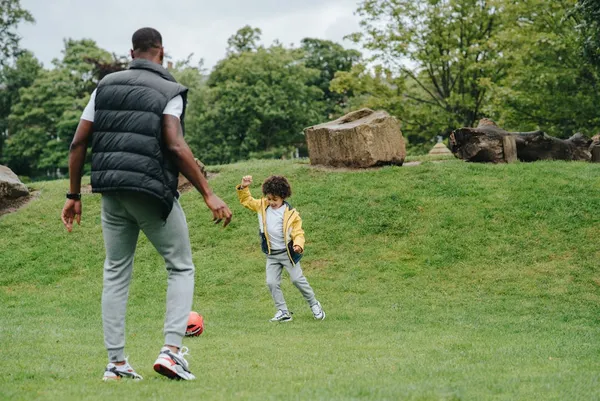We recognise that navigating child custody in the UK requires a thoughtful approach, understanding, and, when necessary, legal intervention. While the process can be challenging, keeping the child's best interests at the heart of all decisions will create a supportive and nurturing environment for their development.

This article provides insight into the challenges that a domestic dad might face when navigating UK child custody laws, some methods of resolution, and tips for keeping the peace.
Understanding Child Custody in the UK
The term "child custody" is commonly used to describe the legal arrangements concerning the care and living arrangements of children post-separation. In the UK, this is generally referred to as "child arrangements," and it involves decisions around where the child lives, who they spend time with, and how they are supported financially. It's important to note that both parents are encouraged to maintain a meaningful relationship with their children, whenever it is in the child's best interest.
Options for Establishing Child Arrangements
Establishing child arrangements can be accomplished through mutual agreement or legal intervention. Here are some steps you may consider:
Communication with Your Co-Parent
The first step is to attempt to reach an amicable agreement with your co-parent. Open communication is vital in devising a plan that prioritises the best interests of the children involved. Consider these aspects:
- Where the child will primarily reside
- Visitation schedules
- Holidays and special occasions
- Decision-making responsibilities
Mediation
If direct discussions are unproductive, engaging in mediation can be beneficial. Mediation provides a neutral platform where both parties can discuss potential arrangements with the help of an impartial mediator. This process is generally less adversarial and can help both parties reach a consensus without going to court.
Legal Intervention
In instances where an agreement cannot be reached, you may need to apply for a court order. This legal procedure is designed to establish a child arrangement order, ensuring that the best interests of the child are prioritised. For more information on how to apply for a court order, visit the official government website.
It is important to understand that the court will always prioritise the child's welfare in making these decisions. The aim is to create an environment that supports the child's growth, security, and happiness.
Co-Parenting Strategies for Dads
Successful co-parenting requires a collaborative mindset and a willingness to work with your former partner for the benefit of your children. Here are some strategies to consider:
1. Maintain Open and Respectful Communication
Effective communication is key to any co-parenting relationship. Discuss issues calmly and respectfully, and focus on problem-solving rather than assigning blame. This helps to create a positive atmosphere for both parents and children.
2. Be Consistent and Reliable
Reliability is crucial in co-parenting. Stick to agreed schedules and be punctual. Consistency provides children with a sense of stability and security, which is especially important during times of change.
3. Prioritise Your Child's Needs
Always consider your child’s needs and preferences when making decisions. Encouraging their participation in certain choices can empower them and make them feel valued and heard.
For more information on creating effective child arrangements, you may visit the Citizens Advice website, which offers guidance and support for parents.
Understanding the Legal Framework
Familiarising yourself with the legal framework surrounding child custody in the UK can be invaluable. Here are some key aspects:
- Parental Responsibility: Parental responsibility refers to the legal rights, duties, powers, and authority a parent has for a child. In most cases, both parents share parental responsibility, which includes making important decisions about the child’s upbringing, education, and health.
- Child Arrangement Orders: When parents are unable to agree on arrangements, a court can issue a child arrangement order. This legally binding document outlines where the child lives, who they spend time with, and how they maintain contact with each parent. To explore the detailed process, the government provides comprehensive information on looking after children post-divorce.
- Best Interests of the Child: The welfare of the child is paramount in any legal decision. Factors such as the child’s emotional and physical needs, age, background, and any risk of harm are considered to ensure the child’s best interests are met.
Resources for Support
There are numerous resources available to support domestic dads in navigating child custody. Seeking advice from professionals and support networks can make a significant difference. Additionally, online forums and local support groups provide a platform to share experiences and learn from others in similar situations.
Exploring these resources can be empowering and offer reassurance during challenging times. Remember, you are not alone, and support is available to help you through the journey of co-parenting.
Final Thoughts for Fathers Navigating Child Custody
While the path to child custody arrangements can be complex, understanding your rights and responsibilities is crucial. By prioritising open communication, consistency, and the child’s best interests, you can create a nurturing environment that supports their well-being. Utilise available resources and seek legal advice when necessary, ensuring you are well-equipped to navigate the process effectively. Remember, your involvement in your child’s life is invaluable, and your efforts to maintain a healthy co-parenting relationship will benefit them in countless ways.
Please be advised this article is for informational purposes only and should not be used as a substitute for advice from a trained legal professional. Please seek the advice of a legal professional if you’re facing issues regarding family law.








